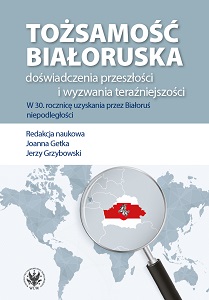Wpływ wyznań religijnych na kształtowanie się białoruskiej świadomości narodowej w XIX wieku
The influence of religious denominations on the formation of the Belarusian national consciousness in the 19th century
Author(s): Antoni Mironowicz
Subject(s): Cultural history, Security and defense, Pre-WW I & WW I (1900 -1919), Interwar Period (1920 - 1939), WW II and following years (1940 - 1949), Post-War period (1950 - 1989), Transformation Period (1990 - 2010)
Published by: Wydawnictwa Uniwersytetu Warszawskiego
Keywords: Orthodox Church; Catholic Church; Belarus; national consciousness
Summary/Abstract: In the late 19th century national movements prevailed in the Russian Empire, and nationality and religion converged. In 1897 Russian territories were dominated by the Orthodox population (75%), which inhabited mainly the European part of Russia and the Siberian regions colonized by the Russians. Orthodoxy was rather weak in the peripheral provinces of the Empire. The Congress Kingdom of Poland was dominated by Catholics, Finland, Estonia and Latvia featured mostly Protestants, while Muslims prevailed in Central Asia. In the 19th century no religion in Belarus was conducive to Belarusian national revival. It is a myth to point to the Uniate Church as a source of national revival. This rite, Latinized in the 18th century, became the object of rivalry between the two main Christian denominations: the Orthodox Church and the Roman Catholic Church. The Russian Orthodox Church, which has been a strong Russification factor on the territory of Belarus, did not foster Belarusian national revival. Even though most of the pioneers of the revival belonged to it, the Catholic Church also did nothing to support the Belarusianization of religious life. Catholicism remained a Polish religion reluctant to Belarusian national ideas. We also have no evidence of any role of Protestant or non-Christian denominations in shaping the Belarusian national movement.
Book: Tożsamość białoruska: doświadczenia przeszłości i wyzwania teraźniejszości
- Page Range: 27-42
- Page Count: 16
- Publication Year: 2021
- Language: Polish
- Content File-PDF

